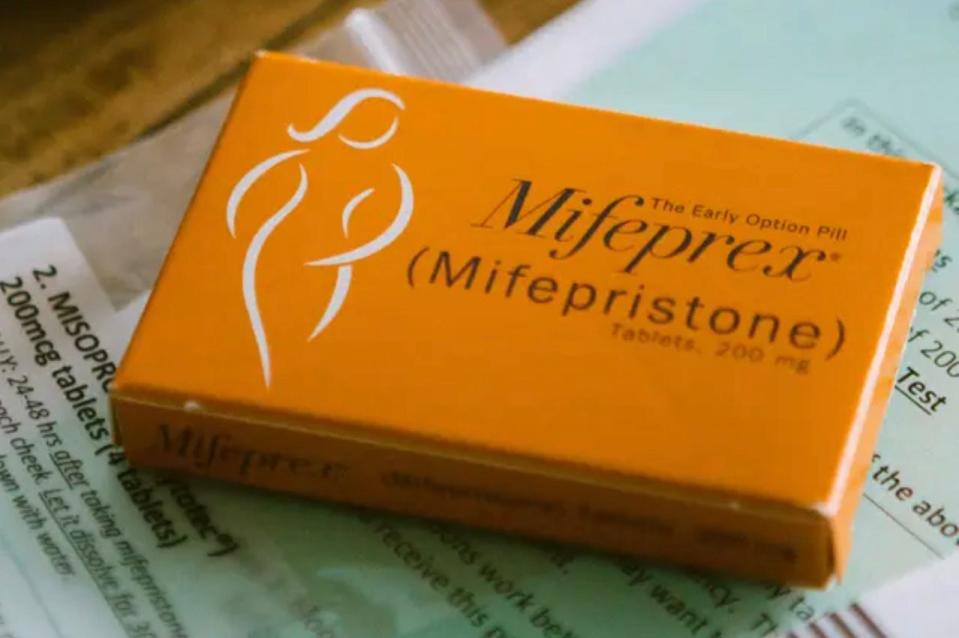South Dakota women getting abortion meds from other states
- Oops!Something went wrong.Please try again later.
The border between Republican-led South Dakota and Democratic-controlled Minnesota has become a firing line in the national clash over abortion rights, with online doctor visits and mail-order prescriptions blurring the lines of state sovereignty and the reach of law enforcement.
On one side is South Dakota Gov. Kristi Noem, who presides over some of the nation’s strictest abortion laws and is a fierce opponent of medication abortion, a process that has become increasingly common since 2000, when the main pill, mifepristone, was approved by the Food and Drug Administration. Medication abortion currently accounts for 54% of abortions in the United States, according to the Guttmacher Institute, a reproductive health organization.
On the other side is Julie Amaon, medical director of Just the Pill, a Twin Cities telemedicine abortion provider that helped 110 South Dakota residents in 2022 with online consultations and prescriptions for abortion medication. The patients cross the border for a consultation on their phone and receive a tracking number for their medication, which they pick up a few days later and then return to South Dakota to take the pills.
South Dakota women were seeking abortions in neighboring states even before the Supreme Court decision to overturn the landmark Roe v. Wade ruling in the summer of 2022, with access to reproductive services virtually shut down in South Dakota due to state laws complicating the process and the COVID-19 pandemic.

Stakes are even higher now that the Supreme Court removed the federal constitutional right to an abortion, leaving it up to states to determine legality and access. South Dakota had a “trigger law” from 2005 that took effect, making it a Class 6 felony for anyone “who administers to any pregnant female or prescribes or procures for any pregnant female” a means for an abortion, except to save the life of the mother. The crime is punishable by two years in prison, a $4,000 fine or both.
Just the Pill started as a nonprofit in 2020, mirroring the telemedicine model of Aid Access, an overseas provider that saw a surge in requests for mail-order abortion pills when states started outlawing abortion. Charging $350 per patient, Just the Pill saw about 1,300 patients in 2021 and increased that number to more than 3,000 in 2022, utilizing online pharmacies such as American Mail Order out of Michigan and Honeybee Health out of California.
More:Post-Roe, Native Americans face even more abortion hurdles
“Roe was always a skeleton – it’s always mattered where you lived in terms of whether you could access care,” Amaon said in an interview with News Watch. “So nothing much has changed for us. Even before the fall of Roe, we were having people travel across state lines for care.”
The organization offers services in not just Minnesota but Wyoming, Montana and Colorado, allowing residents from eastern and western South Dakota and North Dakota to get out-of-state care. Of the 110 South Dakota residents that used Just the Pill in 2022, 65 traveled across the border to Minnesota, 41 to Wyoming, three to Montana and one to Colorado.
South Dakota Attorney General Marty Jackley told News Watch that his office is monitoring the situation and that he expects South Dakota laws to be followed.
The state prohibits abortion “unless there is appropriate and reasonable medical judgment that performance of an abortion is necessary to preserve the life of the pregnant female.” South Dakota law focuses on the person providing abortion services, not the woman terminating her pregnancy.

Asked if someone providing telemedicine abortion services to South Dakota residents in a different state could be prosecuted in South Dakota, Jackley said that could happen, but he hopes the situation doesn’t escalate to that point.
“South Dakota law very clearly prohibits someone from procuring and dispensing abortion-inducing drugs,” he said. “If you aid and abet or you conspire or you actively participate in a criminal act, our reach can go beyond the state’s borders. Obviously, we don’t want to do that, but we’ve made our stance pretty clear.”
The Food and Drug Administration in January 2023 finalized a rule change that expanded the availability of abortion pills to more pharmacies, with the FDA no longer requiring that women pick up the medicine in person, finalizing a rule that started during the COVID-19 pandemic.
Noem and Jackley responded with a Jan. 24 letter to South Dakota pharmacists clarifying that “pharmacies, including chain drug stores, are prohibited from procuring and dispensing abortion-inducing drugs with the intent to induce an abortion and are subject to felony prosecution under the South Dakota law.”

Along with 19 other state attorneys general, Jackley signed a letter to national pharmacies CVS and Walgreens from Missouri Attorney General Andrew Bailey citing the Comstock Act of 1873, which the letter said prohibits using the mail to send or receive any drug that will be “used or applied for producing abortion.”
Asked by the U.S. Postal Service for an interpretation of the Comstock Law, the Biden Administration’s Office of Legal Counsel released an opinion in January 2023 that sending the pills through the mail is not in violation if the sender does not know if the drugs will be used illegally, an interpretation that the Missouri AG’s letter called “bizarre.”
A court case in front of a federal judge in Texas invoking the Comstock Act and challenging the FDA approval of mifepristone could have far-reaching implications for medication abortion, the process of obtaining the pills, and whether the pills themselves are legal.
“They’ve loosened the requirements again and again and again,” Denise Harle, senior counsel with anti-abortion group Alliance Defending Freedom, which brought the lawsuit, told NPR. “So now, mifepristone is being given to women who have never even seen a physician in person.”
Noem and Jackley have both cited safety concerns with medication abortion, saying that if something goes wrong, such as excess bleeding or infection, there won’t be emergency medical care available if a woman is taking the pills at home. Jackley said criminal charges against the person who helped procure the pills could be “much more serious” than a Class 6 felony if a woman suffers harm as a result of taking the medication to end a pregnancy.

“These are very dangerous medical procedures,” Noem said on CBS’ “Face the Nation” in June 2022. “We don’t believe it should be available, because it is a dangerous situation for those individuals without being medically supervised by a physician.”
The Missouri AG’s letter signed by Jackley raised the issue of coerced abortions and also cited a 2015 study that found medication abortions were “5.96 times as likely to result in a complication as first-trimester aspiration abortions.” But Amaon pointed to a study published in Lancet Regional Health medical journal in 2022 that found a 98% success rate in ending the pregnancy for women who accessed abortion pills through a telehealth provider, with the same percentage of patients saying they were satisfied with the experience.
The first pill, mifepristone, works by blocking the hormone progesterone, which the body needs to continue a pregnancy. That process causes the uterine lining to stop thickening and break down, detaching the embryo. The second drug, misoprostol, taken 24 to 48 hours later, causes the uterus to contract and dilates the cervix, which expels the embryo.
“When the FDA approved [mifepristone in 2000], we had lots of good data from Europe from 20 years before that, and now we have tons of good data [from the United States], especially from providing telehealth during the pandemic,” Amaon said. “This is a safe medication that has less than 2 percent concerns with bleeding or infection, and we have a 24/7 call line so we can triage patients if they’re having any of those very rare concerns.”
— This article was produced by South Dakota News Watch, a non-profit journalism organization located online at SDNewsWatch.org.
This article originally appeared on Sioux Falls Argus Leader: South Dakota women getting abortion meds from other states

